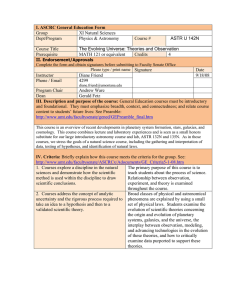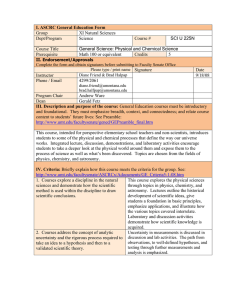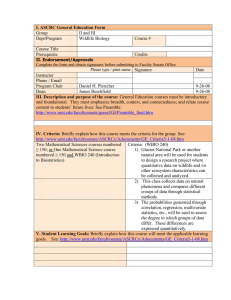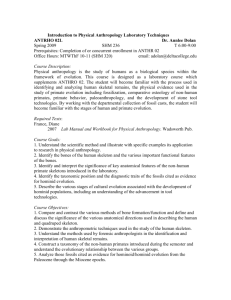Use to propose new general education courses (except writing courses),... gen ed courses and to remove designations for existing gen...
advertisement
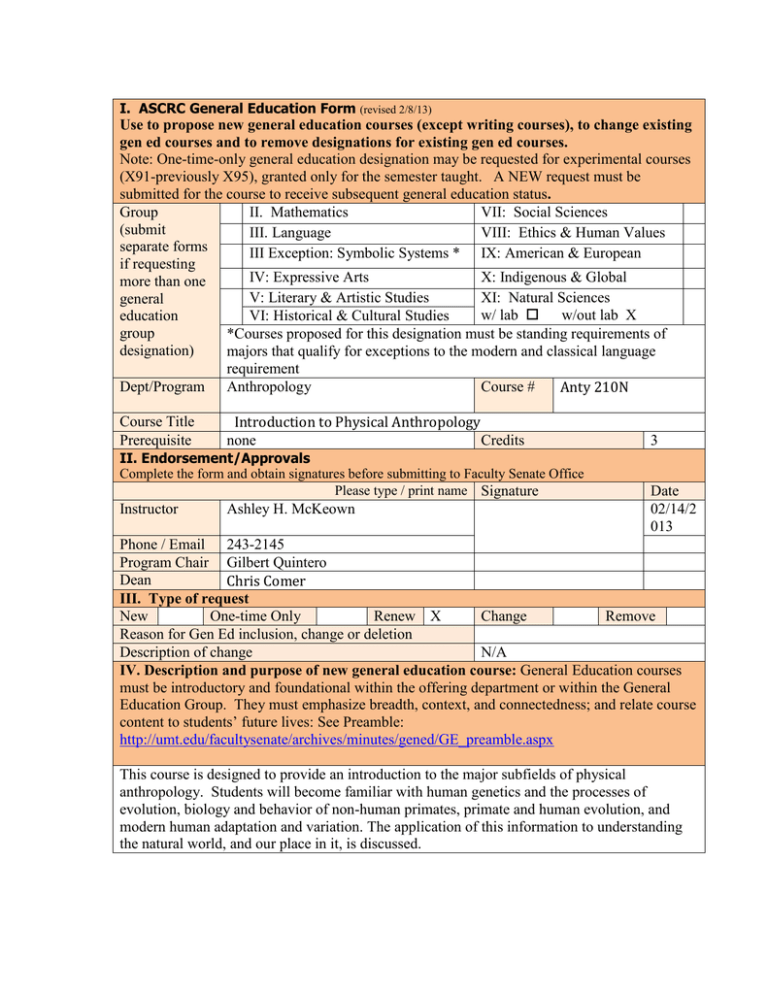
I. ASCRC General Education Form (revised 2/8/13) Use to propose new general education courses (except writing courses), to change existing gen ed courses and to remove designations for existing gen ed courses. Note: One-time-only general education designation may be requested for experimental courses (X91-previously X95), granted only for the semester taught. A NEW request must be submitted for the course to receive subsequent general education status. Group II. Mathematics VII: Social Sciences (submit III. Language VIII: Ethics & Human Values separate forms III Exception: Symbolic Systems * IX: American & European if requesting IV: Expressive Arts X: Indigenous & Global more than one V: Literary & Artistic Studies XI: Natural Sciences general w/ lab w/out lab X education VI: Historical & Cultural Studies group *Courses proposed for this designation must be standing requirements of designation) majors that qualify for exceptions to the modern and classical language requirement Dept/Program Anthropology Course # Anty 210N Course Title Prerequisite Introduction to Physical Anthropology none Credits II. Endorsement/Approvals Complete the form and obtain signatures before submitting to Faculty Senate Office Please type / print name Signature Instructor Ashley H. McKeown 3 Date 02/14/2 013 Phone / Email 243-2145 Program Chair Gilbert Quintero Dean Chris Comer III. Type of request New One-time Only Renew X Change Remove Reason for Gen Ed inclusion, change or deletion Description of change N/A IV. Description and purpose of new general education course: General Education courses must be introductory and foundational within the offering department or within the General Education Group. They must emphasize breadth, context, and connectedness; and relate course content to students’ future lives: See Preamble: http://umt.edu/facultysenate/archives/minutes/gened/GE_preamble.aspx This course is designed to provide an introduction to the major subfields of physical anthropology. Students will become familiar with human genetics and the processes of evolution, biology and behavior of non-human primates, primate and human evolution, and modern human adaptation and variation. The application of this information to understanding the natural world, and our place in it, is discussed. V. Criteria: Briefly explain how this course meets the criteria for the group. See: http://umt.edu/facultysenate/documents/forms/GE_Criteria5-1-08.aspx Courses explore a discipline in the natural This is a broad survey course that exposes sciences and demonstrate how the scientific students to evolutionary theory and its method is used within the discipline to draw application to understanding human and scientific conclusions. primate evolution and variation. Lectures discuss how data regarding primate and human evolution as well as human adaptation and variation are observed and how the data are interpreted using the scientific method. The means by which prevailing theories and hypotheses regarding these topics have been developed and tested are also discussed. Courses address the concept of analytic This class presents data collected by uncertainty and the rigorous process required to scientists working on the topics addressed take an idea to a hypothesis and then to a and how that data is used (or at times has validated scientific theory. been misused) to interpret human and primate evolution and variation. This course seeks to show students how the scientific method is used to develop and test hypotheses and theories about these topics. Lab courses engage students in inquiry-based N/A – Not a lab course learning activities where they formulate a hypothesis, design an experiment to test the hypothesis, and collect, interpret, and present the data to support their conclusions. VI. Student Learning Goals: Briefly explain how this course will meet the applicable learning goals. See: http://umt.edu/facultysenate/documents/forms/GE_Criteria5-1-08.aspx 1) understand the general principles associated This survey course exposes students to the with the discipline(s) studied broad range of subfields within physical/biological anthropology including human genetics, evolutionary theory and process, human evolution, and the biocultural adaptations of humans, our ancestors, and our closest living relatives, the non-human primates. 2) understand the methodology and activities scientists use to gather, validate and interpret data related to natural processes This course exposes students to the scientific method and how information derived through scientific inquiry is applied in the various subfields of physical/biological anthropology. Students are asked to think critically about the theories discussed and alternate theories are sometimes debated. 3) detect patterns, draw conclusions, develop Lectures focus on biological patterns conjectures and hypotheses, and test them by observed in extant and extinct humans and appropriate means and experiments non-human primates. Students are often asked to draw conclusions based on the data presented in class and the validity of those ideas is discussed. The means by which prevailing theories and hypotheses have been developed and tested are also discussed. Lectures discuss how data regarding primate 4) understand how scientific laws and theories and human evolution and human adaptation are verified by quantitative measurement, and variation are collected and interpreted. scientific observation, and logical/critical The foundation for understanding evolution reasoning and variation in humans and non-human primates is genetics and the forces of evolution. Several lectures focus on the laws and rules that guide genetic inheritance including the studies that have provided the supporting quantitative data 5) understand the means by which analytic Throughout this course the processes by uncertainty is quantified and expressed in the which hypotheses are generated and tested natural sciences and scientific theories are validated are discussed. The concept of analytic uncertainty is inherent in this process and is addressed during class lectures. VII. Justification: Normally, general education courses will not carry pre-requisites, will carry at least 3 credits, and will be numbered at the 100-200 level. If the course has more than one pre-requisite, carries fewer than three credits, or is upper division (numbered above the 200 level), provide rationale for exception(s). VIII. Syllabus: Paste syllabus below or attach and send digital copy with form. The syllabus should clearly describe how the above criteria are satisfied. For assistance on syllabus preparation see: http://teaching.berkeley.edu/bgd/syllabus.html Please note: Approved general education changes will take effect next fall. General education instructors will be expected to provide sample assessment items and corresponding responses to the Assessment Advisory Committee.
